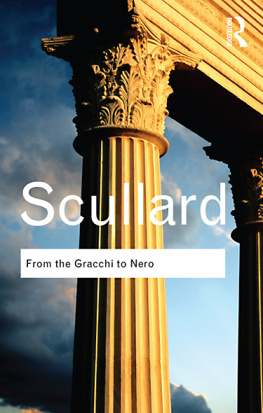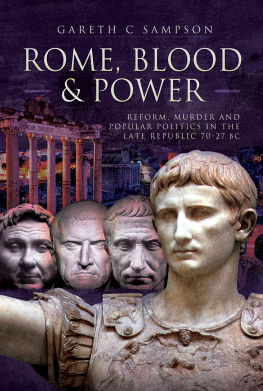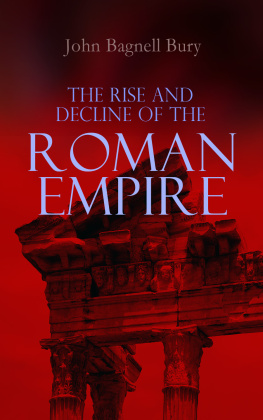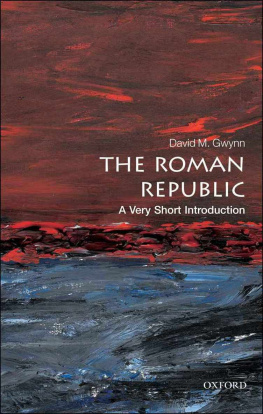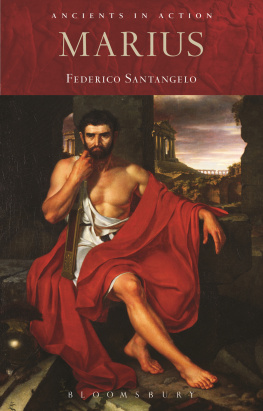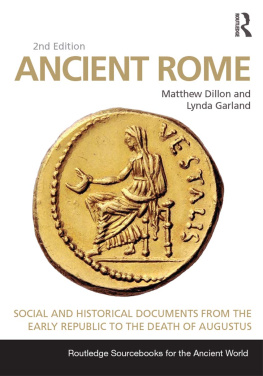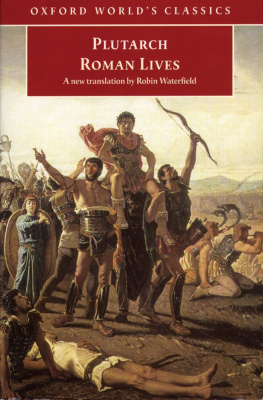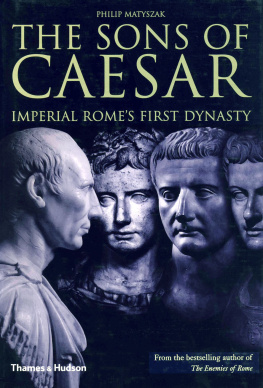From the Gracchi to Nero
Still the best introduction to Roman history
Miriam Griffin, University of Oxford, UK
For a concise, factual narrative of the Roman worlds traumatic transformation from Republic to Empire, [it] remains unsurpassed. As a foundation for university and college courses, it is invaluable.
Richard Talbert, University of North Carolina, Chapel Hill, USA
Without a rival as a guide to the intricacies of Republican politics.
Greg Woolf, University of St. Andrews, UK
A classic textbook: clear, authoritative and balanced in its judgements it has established itself as the fundamental modern work of reference for teachers, sixth-formers and university students it is still the best and most reliable modern account of the period.
Tim Cornell, University of Manchester, UK
This book is a modern classic. It provides a clear narrative of the two centuries from 133 B.C. to 68 A.D., but it is especially valuable for Scullards extensive footnotes which provide undergraduates with both the ancient sources and the most important scholarly contributions.
Ronald Mellor, University of California at Los Angeles, USA

Routledge Classics contains the very best of Routledge publishing over the past century or so, books that have, by popular consent, become established as classics in their field. Drawing on a fantastic heritage of innovative writing published by Routledge and its associated imprints, this series makes available in attractive, affordable form some of the most important works of modern times.
For a complete list of titles visit
www.routledge.com/classics
H. H. Scullard
From the Gracchi to Nero
A history of Rome from 133 B.C. to A.D. 68
With a new foreword by Dominic Rathbone

London and New York
First published 1959 by Methuen & Co.
First published in Routledge Classics 2011
by Routledge
2 Park Square, Milton Park, Abingdon, Oxon OX14 4RN
Simultaneously published in the USA and Canada
by Routledge
270 Madison Avenue, New York, NY 10016
Routledge is an imprint of the Taylor & Francis Group, an informa business
This edition published in the Taylor & Francis e-Library, 2010.
To purchase your own copy of this or any of Taylor & Francis or Routledges collection of thousands of eBooks please go to www.eBookstore.tandf.co.uk.
1959, 1963, 1970, 1976, 1982 H. H. Scullard
Foreword 2011 Dominic Rathbone
All rights reserved. No part of this book may be reprinted or reproduced or utilized in any form or by any electronic, mechanical, or other means, now known or hereafter invented, including photocopying and recording, or in any information storage or retrieval system, without permission in writing from the publishers.
British Library Cataloguing in Publication Data
A catalogue record for this book is available from the British Library
Library of Congress Cataloging in Publication Data
A catalog record for this book has been requested
ISBN 0-203-84478-5 Master e-book ISBN
ISBN10: 0415584884 (pbk)
ISBN10: 0203844785 (ebk)
ISBN13: 9780415584883 (pbk)
ISBN13: 9780203844786 (ebk)
CONTENTS
MAPS AND TABLE
The Roman Empire circa A.D. 68 |
The Roman Empire circa 133 B.C. |
The Roman Empire at the Death of Augustus |
Genealogical Tree of the Chief Members of the Julio-Claudian Dynasty |
Italy |
CHRONOLOGICAL TABLE
| Tiberius Gracchus, tribune, proposes a land law. Opposed by tribune Octavius who is deposed; land law passed and land-commission established. Pergamum bequeathed to Rome by Attalus III. Gracchus murdered. Scipio Aemilianus storms Numantia and settles Spain. Slave war continues in Sicily |
| Court established to punish Gracchus supporters. Land-commission working. Slave-war ended and Sicily reorganized. Revolt of Aristonicusin Asia Minor |
| Lex tabellaria of tribune Papirius Carbo establishes secret ballot for legislation |
| Aristonicus defeated by Perperna |
| Death of Scipio Aemilianus. Organization of province of Asia |
| Law of tribune Pennus de peregrinis. Sardinia restless |
| M. Fulvius Flaccus, consul, proposes enfranchisement of the Latins. Revolt of Fregellae |
| Defeated Fregellans settled at Fabrateria. War against Arverni and Allobroges in Gaul |
| First tribunate of Gaius Gracchus who proposes many laws. Lex Rubria (or 122) establishes Junonia on the site of Carthage; later repealed. Castellum at Aquae Sextiae near Massilia |
| Second tribunate of Gaius Gracchus and further legislation. Opposition of M. Livius Drusus. Gracchus fails to win re-election for 121. Balearic Islands subdued and colonies founded at Palma and Pollentia |
| Senate passes the last decree. Civil disorder in which Gaius Gracchus is killed; his followers executed by Opimius. Defeat of Arverni and Allobroges; Via Domitia constructed in southern Gaul |
| Trial and acquittal of Opimius |
| Marius, as tribune, carries legislation to improve voting methods. Gracchan land-commission abolished. Lex agraria |
| Colony at Narbo Martius in southern Gaul. Adherbal, Hiempsal and Jugurtha become joint rulers of Numidia |
| Death of Hiempsal |
| Jugurtha consolidates his position. Senatorial commission sent to settle Numidian affairs |
| Aemilius Scaurus, consul, regulates apportionment of freedmen in tribes |
| Marius in Spain. Scordisci defeat C. Cato in Macedonia |
| Cn. Carbo defeated at Noreia by Cimbri |
| Jugurtha sacks Cirta. Rome declares war on Jugurtha |
| Lex agraria (lex Thoria?). Temporary agreement with Jugurtha |
| Mamilian enquiry. Renewal of war in Africa; surrender of Aulus Albinus |
| Metellus gains some success against Jugurtha |
| Marius, elected consul, enlists volunteers and proletarii; succeeds Metellus and captures Capsa. Tigurini defeat Cassius in Gaul |
| Birth of Cicero and Pompey. Caepios lex iudiciaria. Marius advances into western Numidia. Bocchus of Mauretania surrenders Jugurtha to Sulla |
| Cimbri and Teutones destroy armies of Caepio and Mallius at Arausio |
| Judiciary law of Servilius Glaucia. Marius, consul II, reorganizes Roman army. Lex Domitia concerning election to the priestly colleges. Second Sicilian Slave War |
| Saturninus tribune: corn law, |

